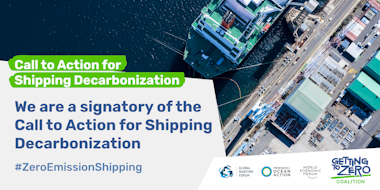Country or Region selection
Worldwide MSC International
Europe
MSC PLEDGES TO ACHIEVE NET ZERO EMISSIONS FROM ITS CRUISE OPERATION BY 2050
22/09/2021- MSC Group’s Cruise Division signs “Getting to Zero” coalition’s Call to Action to help accelerate the decarbonisation of shipping
- The company also involved in several industry-leading research projects exploring technologies and fuels that offer the potential to decarbonise ship operations
Geneva, Switzerland, 22 September 2021 – Today the Cruise Division of MSC Group reaffirmed its long-standing commitment to sustainability by pledging to achieve net-zero greenhouse gas (GHG) emissions in its cruise marine operation by 2050. This target, which will cover both its contemporary MSC Cruises and luxury Explora Journeys brands and goes beyond the International Maritime Organization’s (IMO) ambition to reduce emissions from shipping by 50% by 2050 compared to 2008, sets the Company in a race to help to accelerate the necessary technological and fuel developments required.
MSC has signed Getting to Zero Coalition’s Call to Action to accelerate the decarbonisation of the overall shipping sector, including cruising. The Call to Action includes three demands to enable this: setting a target for zero-emission shipping by 2050; deploying commercially viable zero-emission vessels by 2030; and joint action by the private and public sectors. The Call to Action will be delivered to world governments in November 2021, in advance of COP26.
Pierfrancesco Vago, Executive Chairman of the Cruise Division of MSC Group, said: “As a family business with over three hundred years of maritime heritage, we have always felt a deep responsibility towards our marine environment and our planet. Today we are taking our commitment one step further by embracing a net-zero emissions future within the next three decades. We will achieve this by investing in and otherwise supporting the accelerated development and implementation of innovative, cutting-edge technologies to be deployed across our fleet, continuously raising the bar of environmental performance and leading our industry forward.
“Collaboration between operators, shipyards, technology manufacturers, academic institutions, public authorities, and governments will be essential. There are already encouraging signs of such partnerships enabling progress, but more can and must be done. I call on all parties to work relentlessly towards this end and bring about the next great energy transition in our industry.”
In recent years, the Company has focused on reducing GHG emissions intensity through the introduction of energy efficiency and operational improvement measures across its fleet. Having introduced an annual efficiency improvement of 2-4% across the fleet, by 2019 the company had achieved a 28% efficiency improvement compared to 2008 and is well on track to meeting the IMO’s 2030 40% intensity reduction target.
Looking ahead, energy efficiency improvements and operational measures alone will not be enough to put the shipping sector on a decarbonization course and for this reason, MSC Cruise Division is actively helping accelerate the significant technological evolution that is required. In this spirit, the Company is taking part in several industry research projects seeking to develop the technologies and fuels that offer the potential to enable zero-emissions ships.
- Hydrogen-powered vessels: The MSC Cruise Division recently entered into a partnership with leading shipbuilder Fincantieri and energy infrastructure company Snam to jointly determine the conditions for the design and construction of what could become the world’s first oceangoing hybrid hydrogen/LNG-powered cruise ship, which would allow for zero-emissions operations in certain areas. These include arranging ship spaces to accommodate the necessary hydrogen technologies and fuel cells, identifying the technical parameters of onboard systems, calculating the potential greenhouse gas emissions savings, and technical and economic analysis of hydrogen supply and shore-based infrastructure.
- Fuel Cells on LNG-powered vessels: Fuel cells offer great potential to achieve meaningful reductions. Having ordered three ships that will run on LNG, a transitional fuel that offers up to 21% less greenhouse gas emissions, MSC is studying the integration of fuel cells as a means to achieve further reductions. In 2019, the MSC Cruise Division and Chantiers de l'Atlantique unveiled Blue Horizon, a ground-breaking R&D project that focuses on the integration of a Solid Oxide Fuel Cell (SOFC) technology on LNG-powered cruise ships.
- Retrofitting fuel cell technology: The MSC Cruise Division has also joined a consortium with GE Power Conversion, Lloyd’s Register, and Ceres Power Holdings to explore how to address the barriers to the adoption of fuel cells in large ship applications. It will examine how SOFCs can be integrated into a ship’s operational functionality including the existing power and propulsion architecture and layout, allowing the impact of using SOFC technology to be quantified in terms of overall emissions reduction. The project has been awarded funding as part of the UK Department for Transport’s Clean Maritime Demonstration Competition.
- Low carbon technologies and ship design: The MSC Cruise Division is also partnering with industry leaders and academia in a research project that promotes low-carbon shipping by combining progressive energy technologies and innovative ship design. Led by the University of Vaasa, the CHEK Consortium – deCarbonising sHipping by enabling Key Technology symbiosis on real vessels concept designs project – involves the World Maritime University, Wärtsilä, Cargill, and Lloyds Register, among others.
With this and other future projects, the MSC Cruise Division will continue to work towards a net-zero emissions future for itself and the entire cruise industry.
